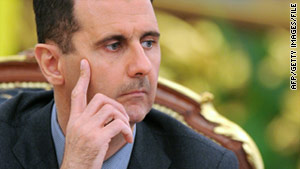 Syrian President Bashar al-Assad’s departure was “inevitable,” a senior U.S. official said on Wednesday, while earlier in the day troops shot dead eight pro-democracy protesters and wounded in 25 at a funeral in the capital Damascus, activists said.
Syrian President Bashar al-Assad’s departure was “inevitable,” a senior U.S. official said on Wednesday, while earlier in the day troops shot dead eight pro-democracy protesters and wounded in 25 at a funeral in the capital Damascus, activists said.
The incident was one of the bloodiest in the capital in the seven-month uprising against Assad, who shows no signs of leaving despite a mounting death toll, Western sanctions, and escalating sectarian tensions between his minority Alawite sect and Syria’s majority Muslim Sunni population.
Syrian authorities, who blame “terrorists” and Islamist militants for the bloodshed, agreed to an Arab League plan on November 2, pledging to pull the military out of restive cities, set political prisoners free and start talks with the opposition, which wants to remove Assad and introduce democratic freedoms.
“Almost all the Arab leaders, foreign ministers who I talk to say the same thing: Assad’s rule is coming to an end. It is inevitable,” U.S. Assistant Secretary of State Jeffrey Feltman, Feltman, who is in charge of near eastern affairs, told a Senate panel.
“Some of these Arabs have even begun to offer Assad safe haven to encourage him to leave quickly,” he said, not naming countries offering Assad a place to go. He said he hoped Assad and his inner circle would “head for the exits voluntarily.”
Since he inherited power from his late father in 2000, Assad has sought to strengthen his strategic position by reinforcing an alliance started by his father with Shi’ite Iran while backing Arab militant groups and sticking to his father’s policy of avoiding direct confrontation with Israel.
Domestically he has lifted some restrictions on trade and private enterprise after decades of nationalisation under his Baath Party.
But economic liberalisation failed to make a major dent in poverty and unemployment and the Alawite ruling elite expanded their dominance of the state, security apparatus and key sectors of the economy, to the disquiet of the Sunni majority.
Although international powers are increasingly critical of Assad’s failure to stem the crackdown, China and Russia oppose U.N. sanctions on Syria.
Western countries have effectively ruled out military action like the air strikes that helped topple Libya’s Muammar Gaddafi. But they have imposed sanctions on Syria’s small but key oil sector and European Union governments agreed on Wednesday to stop Syria accessing funds from the European Investment Bank, a mostly symbolic move since the bank does not extend significant funds to Damascus.
YouTube footage distributed by the Syrian Revolution General Commission, an activist group, purportedly showed several soldiers and security police at a main thoroughfare in the Damascus neighbourhood of Barzeh shooting automatic rifles in the direction of a crowd running to take cover.
The crowd had gathered to mark the funeral of Bassam Abdelkarim Barah, a protester killed on Tuesday. Another video showed people picking up bodies hit by bullets and putting them in a micro pick-up truck while others chanted “God is greatest.”
Local activists said victims had been taken to hospitals outside the city in the suburbs of Tel and in Harasta.
“We managed to treat some of the wounded and get them and the doctors out before the army came and surrounded the hospital,” said an activist in the eastern suburb of Harasta.
Another 16 people were killed elsewhere, mainly in the provinces of Homs and Hama, the Local Coordination Committees activists’ organisation said.
Local activists said hundreds of people were arrested in the city of Homs on Wednesday as troops made house-to-house raids following six days of tank bombardment of a main residential district to suppress protests and an emerging armed insurgency.
The official news agency said life was normal in Homs and municipal departments were removing refuse piled in the streets by “armed terrorist gangs.” Security police defused two homemade bombs in a public park in Khalidiya neighbourhood, it said.
In a letter to the Arab League, the main Syrian National Council opposition group, formed in Istanbul two months ago, said the League initiative had reached a “dead end” after Assad’s forces killed 100 civilians in the last seven days and that it was time “to seek protection for civilians according to all legitimate means under international law.”
Syria’s representative to the Arab League said that Damascus had “gone a long away” towards implementing the plan, pointing to the release of around 500 detainees under a conditional amnesty announced last week.
Officials say Islamist militants and foreign-backed armed gangs have killed 1,100 members of the security forces during seven months of unrest. The United Nations said this week the crackdown has killed 3,500 people. Syrian activists put the number of civilians killed as high as 4,200.
The authorities have banned most foreign media from the country since protests demanding Assad’s removal erupted in March, making it hard to verify reports independently.
An armoured Syrian force stormed a plain northwest of the city of Hama, 240 km (150 miles) north of Damascus on Wednesday, in pursuit of deserters, local activists said.
Tanks pounded villages near the town of Maharda and 14 casualties were reported. Troops surrounded a farm in the village of Khuneizeer where deserters had taken refuge and at least one civilian was killed.
Residents said tanks had returned to the city of Hama after demonstrations grew, and sporadic attacks were reported on troops. Hama, scene of a 1982 massacre by the military, was stormed by troops and tanks three months ago to put down the largest protests of the uprising.

Leave a Reply
You must be logged in to post a comment.